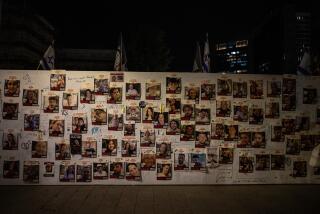Pentagon operation name for Islamic State fight inspires criticism
- Share via
Reporting from WASHINGTON — During World War II, British Prime Minister Winston Churchill urged military leaders to come up with valiant names for battles so no mother of a fallen soldier need say her son was killed “in an operation called ‘Bunnyhug’ or ‘Ballyhoo.’”
More than 70 years later, Pentagon officials faced a similar problem when they struggled to choose an operational name for the widening campaign of airstrikes against Islamic State militants in Iraq and Syria.
The branding effort took weeks, involved a classified Pentagon computer system called NICKA, consultations with military officers in Baghdad and Washington, approval by two dozen partner nations, and the endorsement of top Pentagon brass.
Thus was born Operation Inherent Resolve, a moniker so inherently bland it sparked jokes on late-night TV.
Until 25 years ago, the U.S. military issued random code names for exercises, landing beaches, headquarters, attack plans and other operations, from Aberdeen (an Allied objective in Burma in World War II) to Zipper (another World War II attack plan). The point was to protect secrecy, confuse the enemy and simplify communications.
A few were poetic, in a military sort of way.
The Pentagon called its heavy bombing of North Vietnam from 1965 to 1968 Operation Rolling Thunder, a name that proved so popular it was adopted by a veterans’ advocacy group, a 1977 movie, an annual motorcycle rally and a Bob Dylan concert tour.
Others didn’t prove so trendy.
Operation Killer and Operation Ripper, a double-barreled counteroffensive early in the Korean War, were widely criticized as crude even though the attacks succeeded. And Operation Masher, a 1966 U.S.-led assault in South Vietnam, drew so many jibes it was renamed Operation White Wing.
But for every U.S.-led combat operation in Vietnam named Inferno, Gladiator or Dragon Fire, U.S. troops also were sent on lethal missions named Flip Flop, Hopscotch and Jingle Bells.
The practice of naming military operations is believed to have begun during World War I. Germany branded missions with religious and mythological titles, including Valkyrie and Archangel.
Churchill appreciated those examples. In 1943, he dictated a note that said, in part, that “operations in which large numbers of men may lose their lives” should not be given names that are too boastful, too despondent or “of a frivolous character.”
He urged commanders to use heroes of antiquity, figures from Greek and Roman mythology, the constellations and stars, famous racehorses or names of British and American war heroes.
Churchill personally chose Operation Overlord for the Allied invasion of German-occupied France in June 1944. The crucial phase of that operation, the D-day landings, was called Operation Neptune.
So it went until 1989, when President George H.W. Bush ordered an invasion of Panama that deposed dictator Manuel Noriega. The Pentagon had prepared contingency military plans for Panama under the code name Blue Spoon.
According to Lt. Col. Gregory C. Sieminski’s “The Art of Naming Operations,” published in a military journal in 1995, Gen. James Lindsay, then head of Special Operations Command, called the Joint Chiefs to complain, asking, “Do you want your grandchildren to say you were in Blue Spoon?”
The name was changed to Just Cause, and a trend was born — even if some soldiers mocked that war as Just Because.
Ever since, high-profile U.S. combat campaigns get rousing names that are not only used for funding requests to Congress and bestowing medals and ribbons. They also attempt to shape public perceptions. That’s a polite way of calling them a form of propaganda.
The 1991 war in the Persian Gulf? Desert Storm. The 1993 mission in Somalia? Restore Hope. The 2003 invasion of Iraq? Iraqi Freedom.
The 2001 invasion of Afghanistan? Infinite Justice, until Muslim clerics called it offensive, saying that only God could deliver infinite justice.
Officials “swore they used computers and algorithms and such stuff,” Torie Clarke, an assistant secretary of Defense for public affairs in the George W. Bush administration, wrote in her recent book, “A Survivor’s Guide to Washington.” “I’m pretty sure they scrawled words on a white board and threw darts until they came up with Operation Enduring Freedom,” as the Afghanistan war has been known since.
The Pentagon spent more than two months before it branded the mission against Islamic State as Inherent Resolve.
Administration officials repeatedly were prodded about the lack of a name, especially after the U.S. effort to fight the Ebola epidemic in West Africa was dubbed United Assistance days after it began.
The selection process fell to Gen. Lloyd J. Austin III, commander of U.S. Central Command, and his staff at MacDill Air Force Base in Tampa, Fla.
They didn’t have free rein. They couldn’t use words that “convey anything offensive to good taste or derogatory to a particular group, sect, or creed,” according to military rules.
Suggestions were entered into NICKA, the classified computer system. It tracks military nicknames, code words and exercise terms to ensure they’re not duplicated. Officials say it doesn’t actually generate names.
Precisely who came up with Inherent Resolve is a secret. Gen. Martin Dempsey, chairman of the Joint Chiefs of Staff, had to give his OK. So did Defense Secretary Chuck Hagel.
Linguists did not.
“The words in and of themselves sound great, but ultimately are empty suits — they have no meaning,” said Robin T. Lakoff, a linguistics professor at UC Berkeley. “Once you hear about Inherent Resolve, well, you just know it’s something great, something Americans must support wholeheartedly, whatever it actually is. This has always been one of the most successful games of propagandists, past and present.”
In a statement, Central Command said the name was “intended to reflect the unwavering resolve and deep commitment” to degrade and destroy the Islamic State militants and the threat they pose.
Rear Adm. John Kirby, a Pentagon spokesman, denied reports that Inherent Resolve was initially rejected as uninspiring.
“I understand that some anonymous sources said that the name was rejected,” Kirby told reporters on Oct. 15, when the name was unveiled. “I’m not aware of any overt decision made by leadership here in the Pentagon to reject the name. But that’s the name. It’s out there, and that’s what we’re calling it. And now we’re moving forward.”
More to Read
Sign up for Essential California
The most important California stories and recommendations in your inbox every morning.
You may occasionally receive promotional content from the Los Angeles Times.














